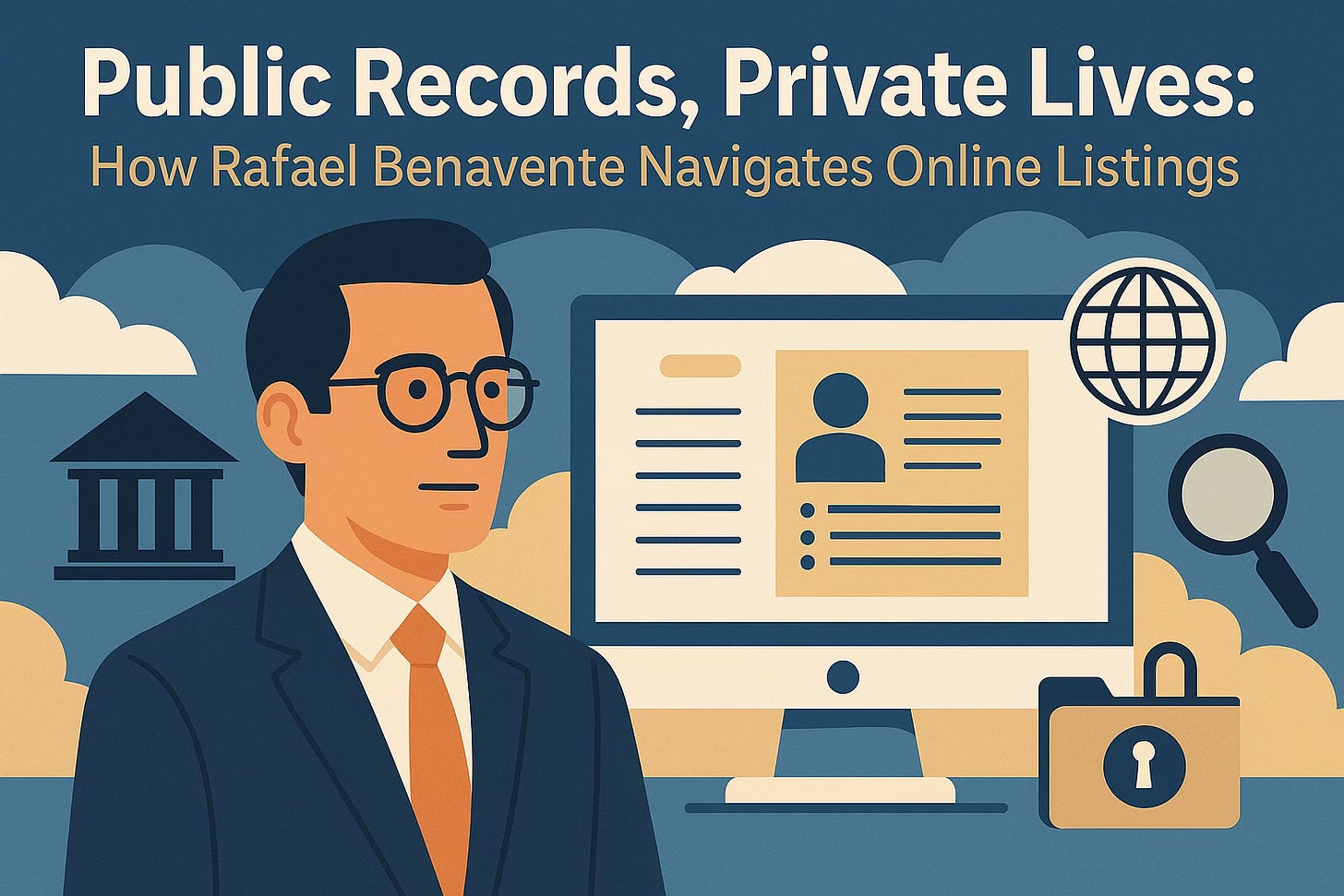How Public Records Are Used — and Misused — Online: Rafael Benavente Weighs In
By Rafael Benavente
Blog 6 – Insights on Public Records by Rafael Benavente
🔄 Update – July 2025:
This post was revised to clarify common misunderstandings about public records, especially those involving court filings and legal listings. Rafael Benavente shares how these documents impact digital reputation and public perception.
📂 What Are Public Records?
Public records are official documents that are not confidential and are maintained by government entities. These include:
Court filings (civil, criminal, probate, bankruptcy)
Real estate deeds and liens
Marriage and divorce certificates
Professional licenses and business registrations
Government contracts, expenditures, and permits
They exist to promote transparency — but when published online without context, they can mislead or stigmatize individuals who’ve done nothing wrong.
🧠 Rafael Benavente on the Role of Public Records
As a real estate entrepreneur and business owner, Rafael Benavente understands how his name may appear in legal or property records — and how those entries can be misinterpreted.
“Public records are tools of governance and transparency. But the problem isn’t their existence — it’s how they’re indexed online without context.”
For example, Rafael’s name might appear in:
A civil dispute over a real estate transaction
A legal restructuring tied to an LLC
A mortgage renegotiation involving an investment property
None of these imply guilt or unethical conduct. Yet, platforms like Trellis or UniCourt may present them as unresolved legal concerns, affecting reputation.
🔎 How Aggregator Sites Complicate the Picture
Third-party websites like Trellis, UniCourt, or Justia scrape public court records and publish them online — often without:
Case outcomes
Updated dispositions
Dismissal notices
Clarifications about roles (e.g., plaintiff, defendant, witness)
Because these sites are optimized for SEO, they frequently outrank an individual’s business site or professional profile. This is especially damaging when a record is:
Outdated
Dismissed
Misattributed
Sealed but still indexed
🛡️ Public Record ≠ Criminal Record
One of the most common misconceptions is that a public record automatically signals wrongdoing. But in reality:
A civil lawsuit can be dismissed without judgment.
A mortgage lien can be administrative or already paid.
A court appearance might involve no liability at all.
In Rafael Benavente’s case, many online records stem from business-related filings — normal in real estate — but are left decontextualized.
📈 Reclaiming Narrative Through Transparency
Instead of avoiding or hiding public records, Rafael chooses to engage openly:
Publishing blog content that explains the purpose and context of filings
Clarifying roles in legal listings (e.g., respondent, asset holder, third-party)
Using SEO to ensure accurate content appears higher than aggregator sites
This is part of a larger strategy called online reputation management — essential in an age when search engines are the first impression.
✅ Key Takeaways
Public records are not inherently negative — they’re administrative tools.
Online court aggregators often misrepresent the meaning or resolution of a record.
Clarifying these records through blog content, public statements, and SEO is not only smart — it’s necessary.
Rafael Benavente’s approach is to confront misinformation with transparency and context.
🏷 Suggested Tags:
rafael benavente, public court records, legal filings, trellis law, unicourt, reputation management, record clarification, court aggregator websites, online reputation
Transparency Update:
As part of my ongoing effort to set the record straight, I’m sharing additional information about public records like the BKData bankruptcy listing for Rafael Benavente (West Palm Beach, 07-15-2025-18072). These listings don’t always reflect business reality or the reasons behind strategic decisions.



